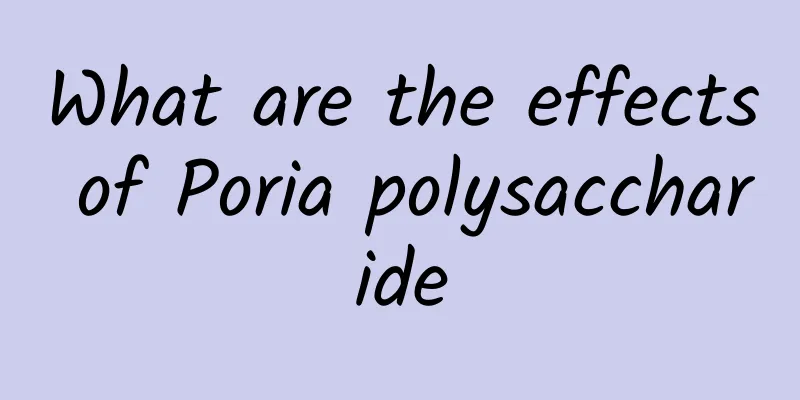The effect of drinking water with Polygala

|
There are many Chinese medicinal herbs in traditional Chinese medicine that people feel unfamiliar with, and Polygala tenuifolia is probably one of them. In fact, Polygala can also play a very good pharmacological effect on the human body. Eating Polygala can promote sleep and solve the problem of insomnia and dreaming. Among them, soaking Polygala in water is the simplest method. The following is a detailed explanation of the benefits of drinking Polygala soaked in water. The efficacy and function of Polygala tenuifolia (I) The efficacy of Polygala It tastes bitter, spicy, and warm in nature. It acts on the heart, kidney, and lung meridians. It has the effects of calming the mind, improving intelligence, removing phlegm and reducing swelling. It is used for insomnia, dreaminess, forgetfulness, palpitations, confusion, coughing up phlegm, sores, swelling and pain in the breasts caused by disharmony between the heart and kidney. (II) The role of Polygala tenuifolia Step 1 Effects on the nervous system (1) Sedative and anticonvulsant effects The root bark of Polygala tenuifolia, the whole root of Polygala tenuifolia without pith removed and the pith of the root all have synergistic effects on barbiturates. (2) Promoting physical and intellectual strength (3) Anti-dementia and brain protection activity Step 2 Effects on the respiratory system Polygala tenuifolia has an expectorant effect, but due to different experimental methods, its expectorant effect varies greatly. Using the phenol red excretion method in mice, the expectorant effect of Polygala tenuifolia was stronger than that of Platycodon grandiflorum, while using the dog respiratory secretion fluid measurement method, its effect was not as good as that of Platycodon grandiflorum. Other scholars have reported that oral administration of 1g/kg Polygala tenuifolia decoction to anesthetized dogs had no expectorant effect. Studies have found that the chemical composition and pharmacological effects of the root bark and root heartwood of Polygala tenuifolia are not exactly the same. The saponin content of the root heartwood of Polygala tenuifolia is only 4% of that of the root bark. The minimum effective dose of the former for expectorant in mice is 1.25g/kg, while the latter has no expectorant effect even at 50g/kg. It is speculated that the expectorant effect of Polygala tenuifolia may be due to the stimulating effect of the saponins it contains on the gastric mucosa, which reflexively promotes the increase in bronchial secretions. The antitussive and expectorant effects of raw Polygala tenuifolia and its processed decoctions on mice were observed using ammonia-induced cough method and colorimetry. The results showed that raw Polygala, honey-processed Polygala, ginger-processed Polygala, and roasted (licorice-processed) Polygala had significant antitussive effects; the high-dose raw Polygala, low-dose honey Polygala, and high-dose roasted Polygala groups also had significant expectorant and antihypertensive effects. Step 3: Effect on central hypertension Polygala decoction has a transient central hypotensive effect. Intravenous injection of 0.125g/kg of 100% Polygala decoction can reduce blood pressure in anesthetized dogs to 60-70% of the original level. Intravenous injection of 0.5g/kg in anesthetized rabbits can also reduce blood pressure to 40-50% of the original level. However, the effect is short-lived and can return to the original level within 1-2 minutes. No rapid tolerance phenomenon was observed after repeated administration. Polygala longifolia Step 4 Effects on smooth and cardiac muscle In vivo and in vitro experiments show that Polygala tenuifolia has a strong uterine stimulating effect. The 100% injection solution prepared from the water decoction of Polygala tenuifolia after ethanol precipitation has a strong excitatory and contractile effect on the isolated non-pregnant uterus of rats and mice. Polygala fluid extract can cause strong contraction of the pregnant and non-pregnant uterus of guinea pigs, rabbits, cats and dogs in vitro and in situ, and increase muscle tension. 3-6mL of 6.6% Polygala decoction injected intravenously also has a significant stimulating effect on the uterus of pregnant dogs. Step 5: Diuretic Effect The suspension made by cold soaking and concentrating the root of Polygala tenuifolia in 50% methanol was orally administered at 200 mg/kg to rats with edema caused by ligation of both jugular veins. The diuretic effect was 8.01, 1.11 ml/l00kg body weight, and the inhibition rate of congestive edema was 100%. Polygala tenuifolia saponins have the effects of eliminating edema and promoting diuresis. If used in combination with phenylbutazone, its diuretic effect will be enhanced. Step 6: Antioxidant and anti-aging effects D-galactose induced aging mice were used to observe the effects of Polygala tenuifolia decoction on the activities of superoxide dismutase (SOD) in red blood cells (RBC) and glutathione peroxidase (GSH-Px) in liver tissue of aging mice. The results showed that the water decoction of Polygala tenuifolia could significantly increase the activity of SOD in RBC and GSH-Px in liver tissue of aged mice, indicating that the water decoction of Polygala tenuifolia had anti-aging effects on aged mice, and the optimal medication time was 30 days. Step 7: Anti-mutation and anti-cancer effects The Amse experiment found that the water-soluble extract of Polygala tenuifolia had a significant inhibitory effect on the number of revertant colonies induced by Aspergillus flavus B1, and had a significant inhibitory effect on the number of revertant colonies of strain TA9, but had no inhibitory effect on the TAIo strain. This indicates that the water-soluble extract of Polygala tenuifolia only contains mutagenic factors that are resistant to alkali substitution. Step 8 Antibacterial Effect The paper strip method showed that 10% Polygala decoction had an inhibitory effect on Pneumococcus, while Polygala ethanol extract had a significant inhibitory effect on Gram-positive bacteria and Shigella dysenteriae, Salmonella typhi and Mycobacterium tuberculosis in vitro. Polygala Step 9 Inhibition of alcohol absorption and hepatoprotective activity The saponins in Polygala tenuifolia can inhibit the absorption of alcohol in the body to a certain extent. Step 10: Blood circulation and anti-inflammatory effects The water extract of Polygala root has a preventive and therapeutic effect on 2,4,6-trinitrobenzenesulfonic acid-induced colitis in mice, and has a significant improvement effect on the symptoms of polymorphonuclear leukocyte infiltration in the distal colon of colitis mice, erosive damage of the large intestine, colonic mucosal cystic abscesses and epithelial regeneration, and colon weight gain. It can also significantly reduce the levels of IFN-y and IL-4 in small intestinal epithelial lymphocytes. It is speculated that the preventive and therapeutic effect of Polygala root on colitis is at least partly attributed to its regulation of IFN-y and IL-4 production. In addition, the water extract of Polygala root has a significant inhibitory effect on the secretion of tumor necrosis factor-a (TNF-a) and interleukin-1 (IL-1) by mouse astrocytes stimulated by substance P and lipopolysaccharide (LPS), thereby producing anti-inflammatory activity on the central nervous system. Step 11 Hemolysis In vitro test tube hemolysis showed that Polygala tenuifolia has a strong hemolytic effect. The hemolytic index of the root bark is 3926, the whole root is 2585, the root woody core is 43, and the purified saponin is 34031. The study found that the component of the hemolytic effect is saponin, so the hemolytic effect of the root bark part which contains more saponins is much stronger than that of the root woody core part. Step 12 Other functions In addition to the above effects, Polygala tenuifolia also has the effects of promoting small intestinal motility, inhibiting aldehyde-keto reductase, reducing cocaine-induced conditioned place preference, resisting vertigo, improving hearing loss caused by hydrops in the membranous labyrinth, and inhibiting 5-HT-induced diarrhea. |
>>: The most effective Chinese medicine for replenishing Yang Qi
Recommend
What are the functions and effects of Polygonum multiflorum powder
In fact, the main effect of Polygonum multiflorum...
Why do men leave yellow marks on their bed sheets and pillows? Nutritionists help you find the culprit
After marriage, women pay more attention to beddi...
Why do people drink ice beer when eating crayfish, but no one drinks ice liquor?
After a week of hard work, how do you plan to tre...
The efficacy and function of gourd seven
As people's living standards continue to impr...
The efficacy and function of short spike pepper
There are so many medicinal herbs in the world, a...
The effects and functions of saddle vine root
In fact, the occurrence of many human diseases is...
Heavy rain makes "fruit freedom" a bubble? Black technology provides a plan B for eating according to the weather
This year, the "violent plum" season ca...
7 eating habits that cancer cells love most. Check to see if you are one of them.
How do you get cancer? This is a question that ma...
Chinese Herb Drynaria
Speaking of the traditional Chinese medicine Dryn...
Foreign trade B2C e-commerce Lightinthebox research report – IPO version
By Li Yan Lightinthebox founder Guo Quji, an MBA ...
Will the moon fall? What is the probability? What would happen if it really falls?
Will the moon fall? If someone asks this question...
The efficacy and function of shrimp grass
Shrimp grass can not only supplement the body'...
Interesting story | What is the relationship between Cao Cao’s migraine and stroke?
Cao Cao was a famous politician, military strateg...
The efficacy and function of goat oil
Goat oil is a famous traditional Chinese medicina...









